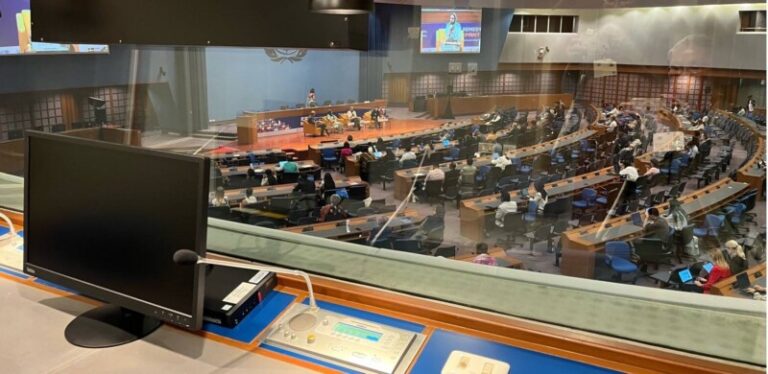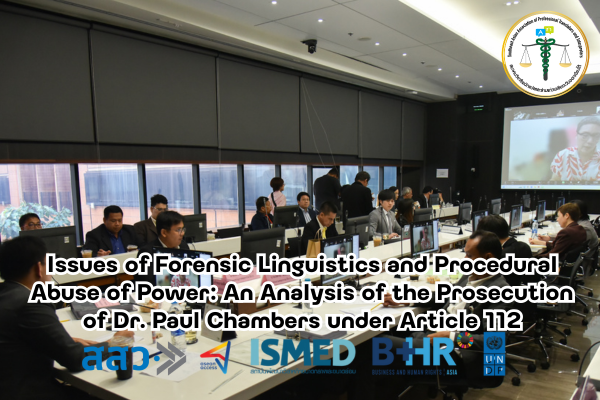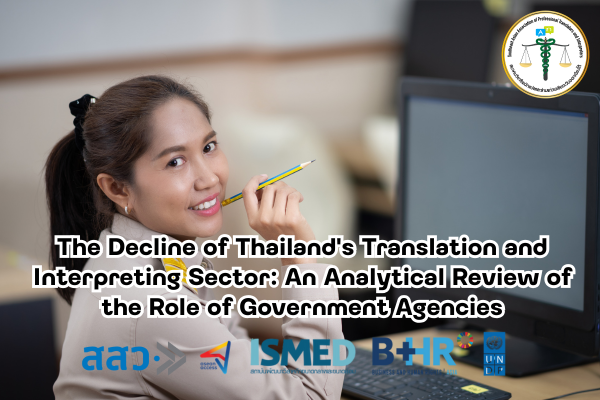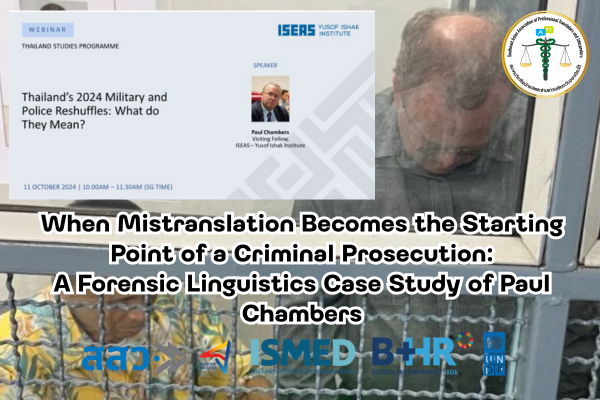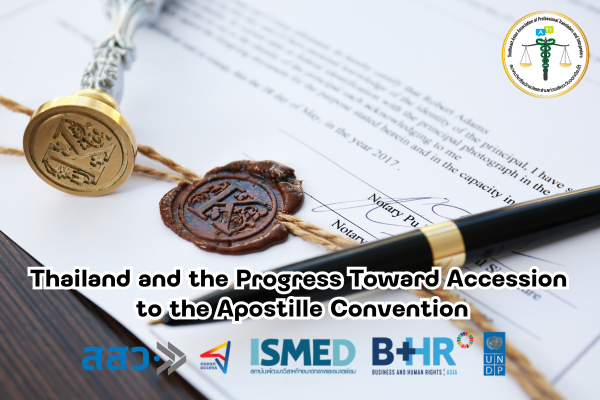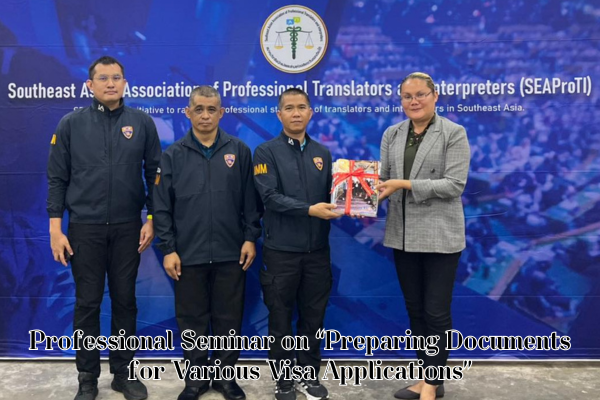Allowing Public Verification and Objection to Professional Accreditation Applicants:
Principles for Transparency and Sustainable Professional Standards
7 January 2025, Bangkok – In an era where transparency and fairness are the cornerstones of societal progress, allowing public involvement in verifying and objecting to the qualifications of professional translators, translation verifiers, and certified interpreters has become a pivotal practice. This approach ensures the integrity and trustworthiness of these professions. A prime example of such a forward-thinking initiative is the Southeast Asian Association of Professional Translators and Interpreters (SEAProTI), which has implemented an open and fair process to build public confidence. This article delves into the benefits and far-reaching impacts of this initiative, structured under the following key sections.
1. The Significance of Public Oversight and Objection
In professions that deal with translation and interpretation, accreditation is vital. These services not only facilitate communication but also impact lives, legal transactions, and even public safety. Public participation in verifying and objecting to candidates’ qualifications is a crucial measure that enhances the credibility of the accreditation process.
-
Preventing Fraud and Corruption
Public scrutiny minimizes the risk of unqualified individuals or fraudsters entering the profession, safeguarding users from substandard services or malpractice. -
Promoting Transparency and Fairness
This process ensures that accreditation adheres to clear, verifiable standards, fostering trust in both the organization and the professionals it certifies.
2. Positive Impacts on the Profession and Society
Public involvement in the accreditation process does more than ensure transparency; it elevates the overall quality and integrity of the profession, benefitting society as a whole.
-
Raising Professional Standards
Open scrutiny motivates candidates to uphold the highest ethical and professional standards, encouraging only the most capable and principled individuals to pursue certification. -
Preventing Long-Term Issues
Early-stage verification and objections help mitigate future conflicts or complaints, such as disputes over translation quality or ethical concerns. -
Building Trust in Organizations
Organizations that prioritize public participation in their processes are more likely to gain the trust and confidence of their users, a vital factor for long-term success.
3. The Process of Verification and Objection: Methodology and Importance
SEAProTI’s approach to public verification and objection is distinguished by its transparency and fairness. The process can be broken down into the following key stages:
-
Disclosure of Candidate Information
Essential details, such as educational background, work experience, and supporting documents, are made publicly accessible through organizational platforms. -
Receiving Public Objections
Citizens with evidence or concerns about a candidate’s qualifications or ethical conduct can submit objections via designated channels, such as email or online forms. -
Fair Evaluation of Objections
A specialized committee of experts examines submitted objections, ensuring thorough and impartial evaluation before making decisions.
4. SEAProTI: A Case Study in Success
SEAProTI has become a benchmark for high standards in professional accreditation. Its open process for public verification and objection is a testament to its commitment to transparency and excellence.
-
Safeguarding Against Fraud
In recent years, SEAProTI has successfully disqualified candidates with questionable backgrounds, such as those who submitted forged documents or provided false information. -
Boosting Public Confidence
Individuals seeking services from SEAProTI-certified translators and interpreters can trust that they are working with professionals who meet rigorous standards of competency and ethics.
5. Recommendations for Enhancing the Verification and Objection Process
While SEAProTI has established a robust system, continuous improvement will ensure it remains a leader in professional standards.
-
Expanding Communication Channels
Providing multiple channels for public objections, such as mobile apps or dedicated hotline services, can make the process more accessible. -
Encouraging Community Participation
Hosting workshops or seminars to educate the public on the importance of the verification process could enhance engagement and awareness. -
Leveraging Technology for Verification
Employing AI and digital tools for document and data verification could increase accuracy and reduce the risk of human error.
6. Conclusion: A New Standard of Transparency
Opening the accreditation process to public scrutiny and objection is a transformative step that underscores a commitment to fairness and transparency. SEAProTI has demonstrated that public involvement not only prevents corruption but also elevates professional standards across the board.
Creating a transparent and just society is a collective responsibility. Encouraging public participation in such critical processes is a practice that should be embraced and continually refined. By doing so, SEAProTI and similar organizations can lead the way in establishing a new standard of excellence in professions that play a vital role in society.
About SEAProTI’s certified translators, translation certification providers, and certified interpreters:
The Southeast Asian Association of Professional Translators and Interpreters (SEAProTI) has officially announced the criteria and qualifications for individuals to register as “Certified Translators,” “Translation Certification Providers,” and “Certified Interpreters” under the association’s regulations. These guidelines are detailed in Sections 9 and 10 of the Royal Thai Government Gazette, issued by the Secretariat of the Cabinet under the Office of the Prime Minister of the Kingdom of Thailand, dated July 25, 2024, Volume 141, Part 66 Ng, Page 100.
To read the full publication, visit: the Royal Thai Government Gazette
การเปิดโอกาสให้ประชาชนตรวจสอบและคัดค้านผู้สมัครรับรองวิชาชีพ:
หลักการสร้างความโปร่งใสและมาตรฐานวิชาชีพที่ยั่งยืน
7 มกราคม 2568, กรุงเทพมหานคร – ในยุคที่ความโปร่งใสและความยุติธรรมเป็นรากฐานสำคัญของการพัฒนาสังคม การเปิดโอกาสให้ประชาชนมีส่วนร่วมในกระบวนการตรวจสอบและคัดค้านคุณสมบัติของผู้สมัครรับรองวิชาชีพ เช่น นักแปลรับรอง ผู้รับรองการแปล และล่ามรับรอง ได้กลายเป็นแนวทางที่สะท้อนถึงความรับผิดชอบขององค์กรที่มุ่งเน้นการยกระดับมาตรฐานวิชาชีพ หนึ่งในตัวอย่างที่โดดเด่นคือแนวทางของ Southeast Asian Association of Professional Translators and Interpreters (SEAProTI) ซึ่งได้จัดกระบวนการที่เปิดเผยและยุติธรรมเพื่อสร้างความมั่นใจให้กับประชาชน บทความนี้จะพาท่านไปสำรวจประโยชน์และผลกระทบของกระบวนการดังกล่าวภายใต้หัวข้อต่างๆ ดังต่อไปนี้
1. ความสำคัญของกระบวนการตรวจสอบและคัดค้าน
ในวิชาชีพที่เกี่ยวข้องกับการแปลและล่าม การรับรองคุณสมบัติผู้สมัครมีความสำคัญอย่างยิ่ง เพราะการแปลภาษาไม่เพียงแต่ส่งผลต่อการสื่อสาร แต่ยังอาจกระทบต่อชีวิตความเป็นอยู่ การทำธุรกรรมทางกฎหมาย หรือแม้แต่ความปลอดภัยของผู้ที่ใช้บริการ การเปิดโอกาสให้ประชาชนมีส่วนร่วมในการตรวจสอบและคัดค้านเป็นมาตรการสำคัญที่ช่วยยกระดับความน่าเชื่อถือในกระบวนการดังกล่าว
-
ป้องกันการฉ้อโกงและการทุจริต
การตรวจสอบช่วยลดโอกาสที่บุคคลที่ไม่เหมาะสมหรือมีพฤติกรรมฉ้อโกงจะเข้าสู่วิชาชีพ องค์กรสามารถป้องกันการรับรองบุคคลที่ไม่มีคุณสมบัติจริง เช่น ผู้ที่มีการปลอมแปลงข้อมูลหรือประวัติ -
สนับสนุนความโปร่งใสและความยุติธรรม
กระบวนการนี้ช่วยให้การรับรองคุณสมบัติเป็นไปตามเกณฑ์ที่ชัดเจนและตรวจสอบได้ เพิ่มความไว้วางใจต่อองค์กรและผู้ให้บริการวิชาชีพ
2. ผลกระทบเชิงบวกต่อวิชาชีพและสังคม
การมีส่วนร่วมของประชาชนในกระบวนการรับรองคุณสมบัติไม่ได้เป็นเพียงการสร้างความโปร่งใส แต่ยังเป็นการสนับสนุนให้วิชาชีพเติบโตไปในทิศทางที่ดีขึ้น
-
ยกระดับมาตรฐานวิชาชีพ
การตรวจสอบที่เปิดเผยช่วยให้ผู้สมัครรักษามาตรฐานวิชาชีพอย่างเคร่งครัด และยังส่งเสริมให้ผู้ที่มีความสามารถและจรรยาบรรณที่ดีเข้าสู่ระบบ -
ป้องกันปัญหาในระยะยาว
การตรวจสอบตั้งแต่ต้นช่วยลดปัญหาที่อาจเกิดขึ้นในอนาคต เช่น ข้อร้องเรียนเกี่ยวกับคุณภาพของการแปลหรือข้อขัดแย้งที่อาจเกิดขึ้นจากการใช้บริการ -
เสริมสร้างความเชื่อมั่นในองค์กร
องค์กรที่ให้ความสำคัญกับการมีส่วนร่วมของประชาชนมักได้รับความไว้วางใจจากผู้ใช้บริการ ซึ่งเป็นปัจจัยสำคัญต่อการพัฒนาองค์กรในระยะยาว
3. กระบวนการตรวจสอบและคัดค้าน: วิธีการและความสำคัญ
กระบวนการตรวจสอบและคัดค้านของ SEAProTI มีความโดดเด่นในแง่ของการออกแบบที่เปิดเผยและยุติธรรม โดยกระบวนการดังกล่าวสามารถแบ่งออกเป็นขั้นตอนหลักๆ ดังนี้:
-
การเปิดเผยข้อมูลผู้สมัคร
ข้อมูลสำคัญ เช่น ประวัติการศึกษา ประสบการณ์ทำงาน และเอกสารรับรอง จะถูกเผยแพร่ผ่านช่องทางที่ประชาชนสามารถเข้าถึงได้ เช่น เว็บไซต์ขององค์กร -
การรับข้อคัดค้านจากประชาชน
ประชาชนที่มีข้อมูลหรือหลักฐานเกี่ยวกับความไม่เหมาะสมของผู้สมัครสามารถยื่นข้อคัดค้านได้ผ่านช่องทางที่กำหนด เช่น การส่งอีเมลหรือแบบฟอร์มออนไลน์ -
การพิจารณาข้อคัดค้านอย่างเป็นธรรม
ข้อคัดค้านที่ได้รับจะถูกนำมาพิจารณาโดยคณะกรรมการผู้เชี่ยวชาญ ซึ่งจะวิเคราะห์ข้อมูลอย่างรอบคอบและเป็นธรรม
4. ตัวอย่างความสำเร็จจาก SEAProTI
SEAProTI ได้รับการยอมรับว่าเป็นหนึ่งในองค์กรที่มีการบริหารจัดการกระบวนการรับรองที่มีมาตรฐานสูง การเปิดโอกาสให้ประชาชนมีส่วนร่วมในการตรวจสอบและคัดค้านเป็นตัวอย่างของการสร้างระบบที่เข้มแข็งและโปร่งใส
-
ป้องกันมิจฉาชีพ
ในปีที่ผ่านมา SEAProTI ได้ปฏิเสธผู้สมัครที่มีพฤติกรรมไม่เหมาะสมและอาจก่อให้เกิดความเสียหายต่อประชาชน เช่น การปลอมแปลงเอกสารหรือการให้ข้อมูลอันเป็นเท็จ -
ยกระดับความไว้วางใจ
ประชาชนที่ใช้บริการของนักแปลและล่ามรับรองที่ผ่านการรับรองจาก SEAProTI มั่นใจในคุณภาพและจรรยาบรรณของผู้ให้บริการ
5. ข้อเสนอแนะเพื่อปรับปรุงกระบวนการตรวจสอบและคัดค้าน
แม้ SEAProTI จะมีระบบที่ดีอยู่แล้ว แต่การพัฒนาและปรับปรุงอย่างต่อเนื่องจะช่วยให้องค์กรก้าวไปสู่การเป็นผู้นำในวิชาชีพได้อย่างมั่นคง
-
เพิ่มช่องทางการสื่อสาร
ควรมีช่องทางที่หลากหลายสำหรับประชาชนในการแจ้งข้อคัดค้าน เช่น การใช้แอปพลิเคชันหรือระบบแจ้งข้อมูลผ่านมือถือ -
ส่งเสริมการมีส่วนร่วมของชุมชน
การจัดกิจกรรมหรือสัมมนาเพื่อให้ประชาชนเข้าใจถึงความสำคัญของกระบวนการตรวจสอบจะช่วยให้เกิดการมีส่วนร่วมมากขึ้น -
เพิ่มการใช้เทคโนโลยีในการตรวจสอบ
การนำ AI หรือระบบดิจิทัลมาใช้ในการตรวจสอบเอกสารและข้อมูลจะช่วยเพิ่มความแม่นยำและลดข้อผิดพลาด
6. บทสรุป: ก้าวสู่มาตรฐานใหม่แห่งความโปร่งใส
การเปิดโอกาสให้ประชาชนตรวจสอบและคัดค้านคุณสมบัติของผู้สมัครรับรองวิชาชีพเป็นก้าวสำคัญที่สะท้อนถึงความมุ่งมั่นในการสร้างระบบที่โปร่งใสและยุติธรรม SEAProTI ได้แสดงให้เห็นว่าการมีส่วนร่วมของประชาชนไม่เพียงช่วยป้องกันการทุจริต แต่ยังสนับสนุนการยกระดับมาตรฐานวิชาชีพในทุกมิติ
การสร้างสังคมที่โปร่งใสและเป็นธรรมเป็นหน้าที่ของทุกฝ่าย การมีส่วนร่วมของประชาชนในกระบวนการนี้จึงเป็นสิ่งที่ควรส่งเสริมและพัฒนาให้ดียิ่งขึ้น เพื่อให้ SEAProTI และองค์กรอื่นๆ ก้าวไปสู่การเป็นต้นแบบของความเป็นเลิศในวิชาชีพที่สำคัญต่อสังคม
เกี่ยวกับนักแปลรับรอง ผู้รับรองการแปล และล่ามรับรองของสมาคมวิชาชีพนักแปลและล่ามแห่งเอเชียตะวันออกเฉียงใต้
สมาคมวิชาชีพนักแปลและล่ามแห่งเอเชียตะวันออกเฉียงใต้ (SEAProTI) ได้ประกาศหลักเกณฑ์และคุณสมบัติผู้ที่ขึ้นทะเบียนเป็น “นักแปลรับรอง (Certified Translators) และผู้รับรองการแปล (Translation Certification Providers) และล่ามรับรอง (Certified Interpreters)” ของสมาคม หมวดที่ 9 และหมวดที่ 10 ในราชกิจจานุเบกษา ของสำนักเลขาธิการคณะรัฐมนตรี ในสำนักนายกรัฐมนตรี แห่งราชอาณาจักรไทย ลงวันที่ 25 ก.ค. 2567 เล่มที่ 141 ตอนที่ 66 ง หน้า 100 อ่านฉบับเต็มได้ที่: นักแปลรับรอง ผู้รับรองการแปล และล่ามรับรอง



